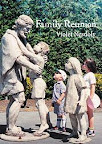"America grows older yet stays focused on its young. Whatever hill we try to climb, we're over it by fifty — and should that hill involve entertainment or athletics we're finished long before. There are exceptions to this rule, of course, but supermodels and newscasters, ingenues and football players all yield to the harsh tyranny of time. They turn on Fortune's wheel. Look what happens to the overnight sensation or pick of the week or fashion of the season or rookie of the year. First novels have a better chance of being noticed than a fourth or fifth. Although we're aging as a nation we don't do it willingly: The face-lift and the tummy-tuck are — against the law of gravity — on a commercial rise....
"This book is about tribal elders in the world of art. What interests me is lastingness: how it may be attained. For obvious reasons, this has become a personal matter; I published my first novel in 1966 and very much hope to continue. Too, such hope feels representative: a "generational" problem in both senses of the word. An ever-growing number of Americans are middle-aged or elderly; no natural catastrophe has thinned our swelling ranks. And the habit of creation does not die, so there are more who paint the sunset or take piano lessons or hunt the perfect end-rhyme at day's end. Our generation, like all others, yearns to produce some something that continues — and the generative impulse, when artistic, lingers on."
So begins the Introduction to Nicholas Delbanco's book Lastingness: The Art of Old Age. In it he explores how aging affects artists. He extracts thoughts about aging artists, their processes and persistence from people like Monet (who had cataracts) and John Updike who was still at work on writing projects when he died in 2009 at 76 years of age.
An article about Delbanco's book on the NPR site explores some of the book's ideas as well as treating us to a 6-minute interview with Delbanco.
The three questions Delbanco asked John Updike were:
1. How have your work habits changed at present from the days when you were an apprentice to the trade?
2. How have your aspirations changed; do you think of a day's work as "more of the same" or have you set yourself different goals?
3. Can you point me to a passage — or passages — in your own writing which deals with these issues, either head-on or obliquely?
Here's a snippet from Updike's answer to #3.:
"By and large what lasts best is the most concrete, the most actual, delivering to the reader a piece of earth and humanity. Aesthetic flourishes fade and wrinkle, though they may get attention when new. A blunt sincerity outlasts finely honed irony, I would think. An ability to see over the heads of important contemporary issues into the simple truth of daily life is what we can respond to a century later. . . ."Read Updike's complete answers HERE (partway down the page).
How would you answer the questions Delbanco asked Updike?
*************
Related:
- A Bible thought:
"Make a careful exploration of who you are and the work you have been given, and then sink yourself into that. Don't be impressed with yourself. Don't compare yourself with others. Each of you must take responsibility for doing the creative best you can with your own life." - Galatians 6:4-5 (Message)
- Liesel Mueller has written a wonderful poem about Monet and his vision problems. "Monet Refuses the Operation" begins:
Doctor, you say there are no haloes
around the streetlights in Paris
and what I see is an aberration
caused by old age, an affliction.
I tell you it has taken me all my life
to arrive at the vision of gas lamps as angels,
to soften and blur and finally banish
the edges you regret I don't see,
to learn that the line I called the horizon
does not exist and sky and water,
so long apart, are the same state of being . . .
Read entire...


0 comments:
Post a Comment